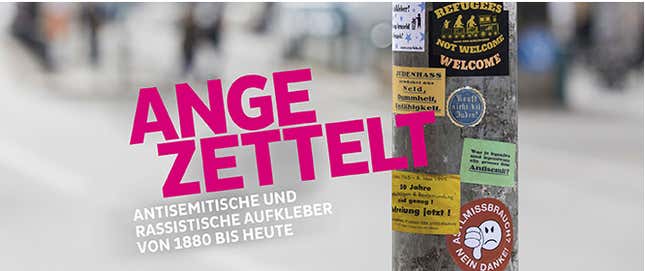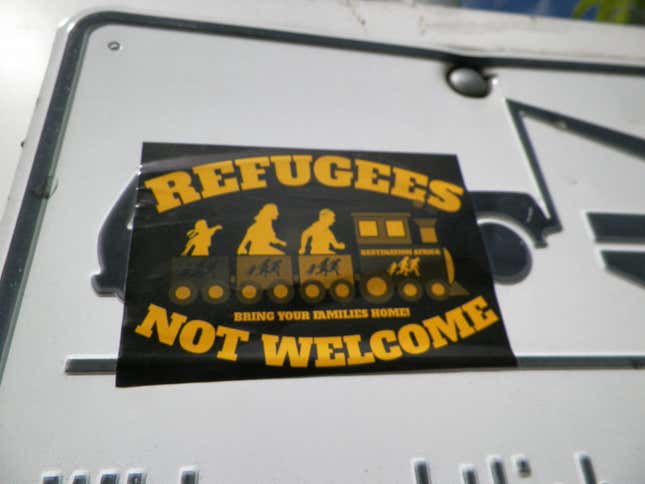“The first time I removed a sticker, I felt so good that I had done something,” Irmela Mensah-Schramm says.
The flyer she destroyed proclaimed “Freedom for Rudolf Hess.” Hess, Hitler’s deputy, was still in Spandau prison at the time, serving a life sentence for war crimes he was convicted of at the Nuremberg Trials forty years earlier. She removed that first message of hate in 1986—and Mensah-Schramm, 70, is still doing much the same today.
“If I don’t do it, who will?” she asks.
Mensah-Schramm—who looks like a kindly grandmother, with her white hair and smiling face—has been physically assaulted by neo-Nazis, threatened with fines by authorities, and derided by those around her, but still she looks for hateful stickers on letterboxes, road signs, and lampposts. She photographs them, and either scrapes them off or sprays over them. Her eagle eye notices stickers that most passers-by never spot.
It’s a Sisyphean task for the dogged activist, who was recognized with the Göttinger Peace Prize last year and whose meticulous collection of 100,000-plus hate signs that she’s removed over three decades forms part of the exhibition, “Anti-Semitic and racist stickers from 1880 to the present day,” currently on at the German History Museum in Berlin.

In the eight weeks since she handed her collection over to the museum, she’s filled another binder with another 200 fascist stickers.
Germany took in a million migrants last year—more than the US has taken in the past 10 years. And Mensah-Schramm has noticed a dramatic increase not only in the quantity of racist messages in public places, but also in the number of different groups or individuals involved.
It mirrors the spike in crimes against immigrants revealed in a recent German government report, which said there had been a fivefold increase in attacks on refugee homes in 2015, to an average of nearly three per day. In 2015, almost 39,000 politically motivated crimes (paywall) were recorded in Germany, with about three quarters of these committed by extremists. More than half are propaganda crimes, like distributing offensive materials.

“There were also a lot of stickers before the refugee crisis, but they were different,” says Mensah-Schramm, featuring blunter messages like “Foreigners out.” “In recent times I’ve found relatively few anti-Semitic messages because refugees are seen as the new enemy,” she says.
There are, however, still anti-Semitic messages out there—she removed one saying “Jews, off to the ovens” earlier this year. A former teacher in a school for mentally disabled children, Mensah-Schramm was deeply affected after visiting a Nazi concentration camp in her forties—she goes back every year to remember the dead.
A few years later, she scraped off the Hess sticker.
“Keep your blood pure!”
A lot of these stickers carry website details on them, which highlights a huge number of different groups or organizations that are churning out the crude messages of hate. “It used to be mainly Germany’s National Party (NPD), but now the right-wing groups are competing with each other,” she says. “All together it has a more menacing effect.”
The messages are often in English, so foreigners have more chance of being able to understand them. “Refugees not welcome” and “Stop the asylum-seeker flood” are common. Another harks back to the old Nazi aesthetic, with a woman in the traditional Bavarian dirndl dress carrying a child:
German woman! Don’t let foreigners touch you. Keep your blood pure. You hold within you the future of the race!
The police don’t really do anything about trying to catch the people putting up these messages, according to Mensah-Schramm. On one occasion, when she called the police whilst being pushed and shoved by neo-Nazis, the policeman told her off for removing stickers. Hate speech may be forbidden in Germany, but so is removing posters from public or private property.

When Hitler’s Mein Kampf was re-issued in print in 2015, Mensah-Schramm was featured in a counter-book “Mein Kampf gegen Rechts” (link in German, My Struggle Against the Right), a collection of first-person essays about people standing up to rightwing extremism.
Constantly confronting hatred is “so depressing” and takes a huge mental toll on her. “I do this dirty job, and I’ve recognized that I need to keep my strength up as I have so much more to do, but sometimes when I come home I’m completely beat for a whole next day,” she says.
But she’s showing no signs of letting up. She’s taking her “Hatred Destroys” exhibition around the country to educate people, running workshops for school kids, and of course, continuing to spray away hate. ”Anything that’s done to me can be fixed, but human dignity can’t,” she said.
